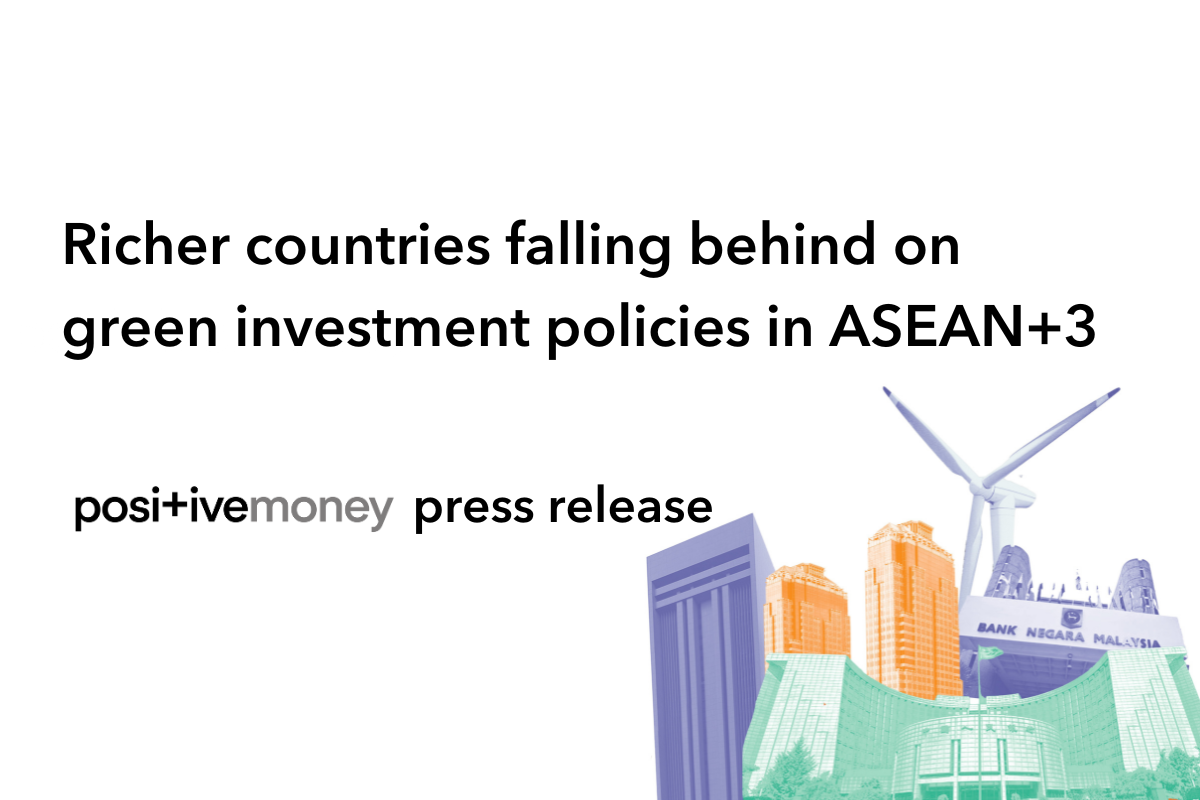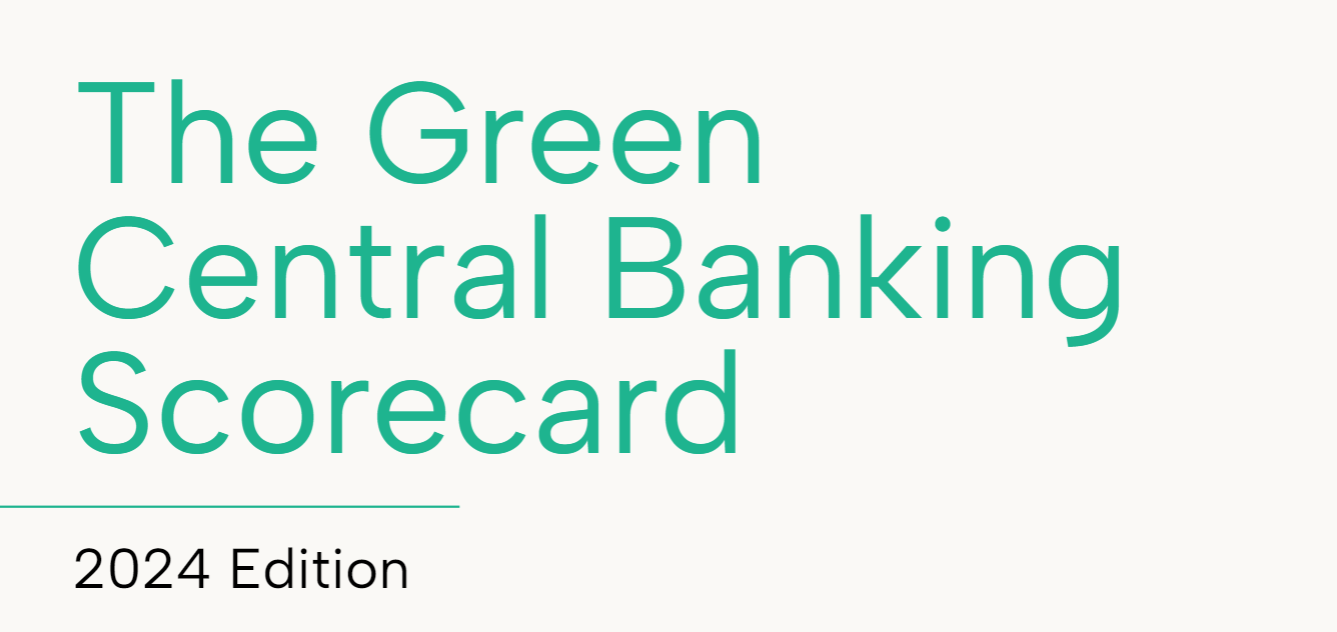
UKGlobal
10 September 2025
Other historical emitters urged to put pressure on the Fed to step up
September 26 2024 - The Federal Reserve has the ‘greatest responsibility’ to take climate action, according to an updated G20 ranking which finds that the Fed has failed to advance its score at all since the scorecard was last updated in November 2022.
Endorsed by over 20 leading research institutes and NGOs, including the New Economics Foundation and ShareAction, the 2024 update to Positive Money’s Green Central Banking Scorecard assesses the relative progress G20 central banks have made in their efforts to green the financial system.
The Federal Reserve’s fall from 16th to 17th place comes down to “a pattern of missed opportunities” from the US central bank to integrate climate considerations into its monetary and financial policies, according to the scorecard’s authors. The global dominance of the dollar, the size of the US economy, and US banks’ investments in environmentally-destructive activities, are all cited as reasons why action from the Fed is vital to setting a global benchmark for climate action.
The report also highlights inequalities in culpability for climate change between G20 members. It is the US’ status as the highest emitting country globally in terms of fossil fuels, the second highest globally by land use and forestry, and second highest globally by cumulative emissions per population, which leads the authors to conclude that the Fed has the ‘greatest responsibility’ for tackling the climate crisis.
But historic responsibility for climate change isn’t exclusive to the Fed, the authors claim. Whilst European central banks extended their lead this year, taking the top four spots, and are urged to hold the Fed accountable and pressure it to take on a leadership role, the report also acknowledges the unequal power dynamics at play in the G20. As historically high emitters with vast resources at their disposal, in no small part due to the colonial exploitation of other countries, Positive Money argues that European central banks share the US’ responsibility to support countries that are most exposed to climate risks and in need of green investment to finance their own sustainable transitions.
The authors stress that even among the top performers, there are substantial gaps in the adoption of high-impact policies necessary to steer financial systems away from carbon-intensive activities and toward sustainable alternatives, which is why no central bank has yet advanced beyond a “B+” rating.
Positive Money also points to improvements in the scorecard methodology which have strengthened the accuracy of scores in the new edition by better reflecting the impact of central banks and financial supervisors’ climate actions - separating those taking concrete action to green their operations from those neglecting their responsibility to do so.
Other notable changes in the rankings include:
India climbed from 12th place to 10th, having made formal commitments to multiple medium impact policies, including mandatory disclosures for financial institutions and system-wide stress testing exercises, as well as discussing further medium impact actions.
Brazil entered the top five this year, for introducing policies including ESG disclosure requirements for banks and Pillar 2 capital requirements for banks with poor management of climate/nature risks.
South Africa has advanced from 18th to joint 11th place this year, as it’s among the countries playing a leading role in the Network for Greening the Financial System (NGFS), and has repeatedly issued climate-related guidance for financial firms
The UK has fallen behind other central banks, dropping from fifth place to seventh, having not committed to any high impact monetary policies, and only having implemented a few medium impact policies
Positive Money’s Zack Livingstone, lead author of the report, said:
“As a key player in global finance, the Fed's actions—or lack thereof—send a powerful message to other countries and institutions.
“By failing to prioritise climate considerations, the Fed acts as an obstacle to wider progress.
“We call on global financial leaders to hold the Fed accountable, and urge it to adopt climate policies and set an example for others. For those at the forefront of the NGFS, this should be a top priority, given the profound impact an environmentally-focused US central bank would have on the global financial landscape.”
Notes
View the new 2024 edition of the scorecard here (the page will go live a few minutes before the embargo is lifted): https://positivemoney.org/publications/green-central-banking-scorecard-2024
The first scorecard report was published in March 2021: https://positivemoney.org/publications/green-central-banking-scorecard/
A updated scorecard ranking was published in October 2021, ahead of COP26: https://positivemoney.org/archive/bank-of-england-slips-behind-on-climate-ahead-of-cop26/
The second report in the series was published in November 2022: https://positivemoney.org/publications/green-central-banking-scorecard-2022/
Positive Money reviewed the Scorecard’s methodology in January 2024: https://positivemoney.org/publications/green-central-banking-scorecard-methodology-review/
An interactive version of the scorecard is available here: https://greencentralbanking.com/scorecard/
The three commercial banks that provided the largest amount of finance to fossil fuel expansion between 2016 and 2023 were all US-based: http://www.bankingonclimatechaos.org/
For more information or to arrange a briefing/interview with a spokesperson, please contact press@positivemoney.org.uk or chloe.musto@positivemoney.org.uk
About Positive Money
Positive Money is an international research and campaign organisation working to redesign our economic system for social justice and a liveable planet. Set up in the aftermath of the financial crisis, Positive Money is a not-for-profit company funded by charitable trusts and foundations, as well as small donations from its network of supporters. Find out more: www.positivemoney.org
